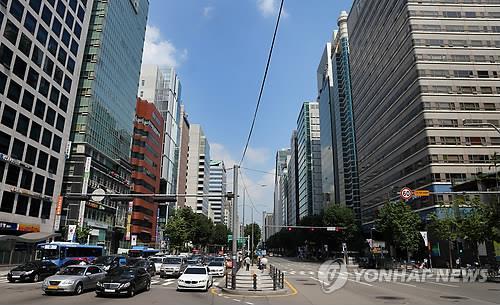South Korea will cope actively with a recent wave of foreign trade pressure on Korean companies, the country's trade minister said Friday.
"The government will not turn a blind eye to South Korean companies, which suffer from unfair treatment in the overseas market," Minister of Trade, Industry and Energy Joo Hyung-hwan said in a meeting with reporters.

"South Korean businessmen often say they are treated unfairly in overseas markets. So I try to make every effort to broach such an issue when I meet with my counterparts in foreign countries."
Joo, who took office in January, has made overseas trips eight times so far.
"Should a problem arise with exports of steel products to Indonesia, for example, I will be able to convey the positions of South Korean companies to the Jakarta government," he said.
Touching on a recent U.S. decision to slap high anti-dumping tariffs on South Korean galvanized steel sheets, the minister said he will try to find what role he can play in resolving the issue.
"The decision has yet to be approved by the U.S. International Trade Commission, so there still remains an opportunity to convey our position to Washington," Joo said. "I will try to find my role."
In late May, the U.S. Department of Commerce decided to impose anti-dumping tariffs of 48 percent on South Korean galvanized steel sheets, saying they are sold at unfairly low prices in America.
Joo said Seoul will try to explain the merits and drawbacks of the South Korea-U.S. free trade deal to U.S. businessmen since Washington's anti-free-trade sentiment will come to the fore whoever wins the U.S. presidential election in November.
"South Korea has seen an increase in the surplus in trade of goods with the U.S. following the agreement, while Washington's service account surplus has grown," he said.
The bilateral free trade agreement was initially signed in April 2007. It went into effect nearly five years later in March 2012, after it was ratified by the U.S. Congress in October 2011 and by the South Korean parliament the following month.
Joo further dismissed the possibility of renegotiating the trade deal raised by presumptive Republican presidential nominee Donald Trump. "Renegotiation of the deal is realistically hard."
In mid-May, a senior adviser to Trump said the real estate tycoon, if elected, may wish to go back to the drawing board on all FTAs the U.S. has signed so far, including the Korea-U.S. FTA.
Minister Joo, meanwhile, said fundamental efforts should be made to increase South Korea's exports that are showing signs of recovery. "There are improvements in export items and markets with the daily average value and volume gaining. But it is important to boost exports in a structural way rather than on a short-term basis."
South Korea's exports continued to drop on-year in May but the rate of decline eased sharply. Outbound shipments fell 6 percent on-year to $39.78 billion last month, compared with an 11.2 percent tumble in April. It also marked the slowest on-year decline this year. (Yonhap)







